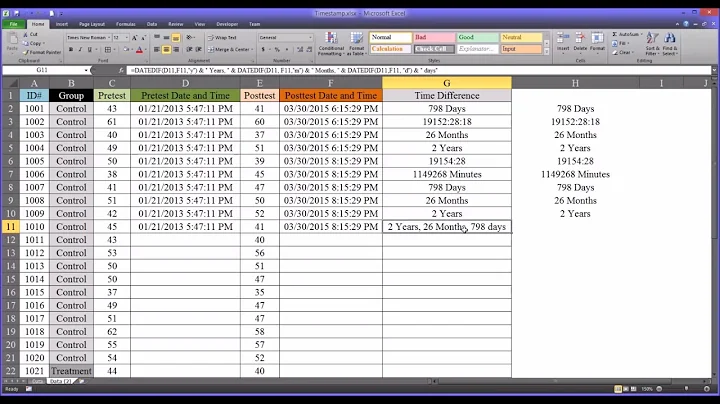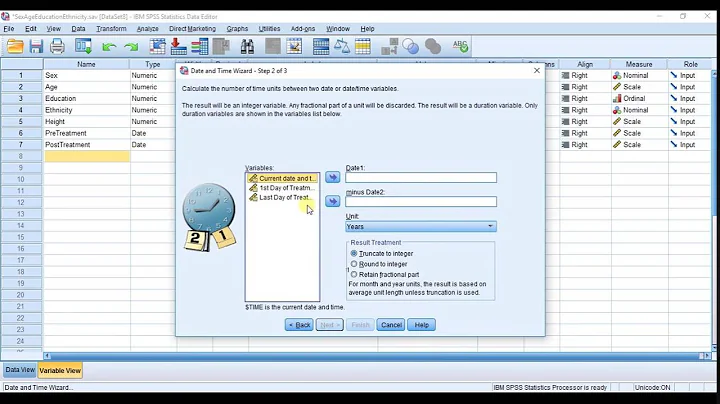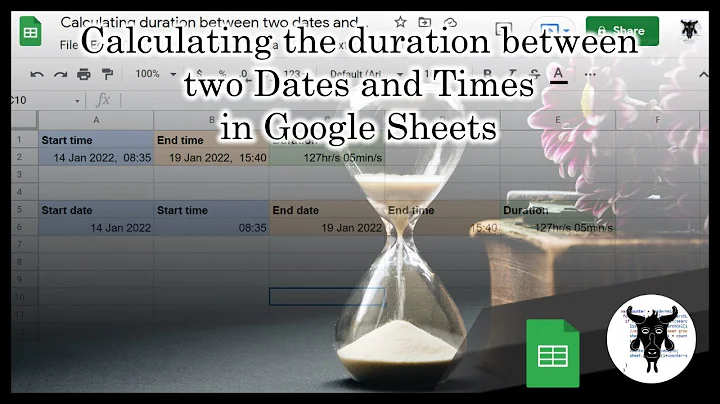Get the time difference between two datetimes
Solution 1
This approach will work ONLY when the total duration is less than 24 hours:
var now = "04/09/2013 15:00:00";
var then = "04/09/2013 14:20:30";
moment.utc(moment(now,"DD/MM/YYYY HH:mm:ss").diff(moment(then,"DD/MM/YYYY HH:mm:ss"))).format("HH:mm:ss")
// outputs: "00:39:30"
If you have 24 hours or more, the hours will reset to zero with the above approach, so it is not ideal.
If you want to get a valid response for durations of 24 hours or greater, then you'll have to do something like this instead:
var now = "04/09/2013 15:00:00";
var then = "02/09/2013 14:20:30";
var ms = moment(now,"DD/MM/YYYY HH:mm:ss").diff(moment(then,"DD/MM/YYYY HH:mm:ss"));
var d = moment.duration(ms);
var s = Math.floor(d.asHours()) + moment.utc(ms).format(":mm:ss");
// outputs: "48:39:30"
Note that I'm using the utc time as a shortcut. You could pull out d.minutes() and d.seconds() separately, but you would also have to zeropad them.
This is necessary because the ability to format a duration objection is not currently in moment.js. It has been requested here. However, there is a third-party plugin called moment-duration-format that is specifically for this purpose:
var now = "04/09/2013 15:00:00";
var then = "02/09/2013 14:20:30";
var ms = moment(now,"DD/MM/YYYY HH:mm:ss").diff(moment(then,"DD/MM/YYYY HH:mm:ss"));
var d = moment.duration(ms);
var s = d.format("hh:mm:ss");
// outputs: "48:39:30"
Solution 2
Your problem is in passing the result of moment.duration() back into moment() before formatting it; this results in moment() interpreting it as a time relative to the Unix epoch.
It doesn't give you exactly the format you're looking for, but
moment.duration(now.diff(then)).humanize()
would give you a useful format like "40 minutes". If you're really keen on that specific formatting, you'll have to build a new string yourself. A cheap way would be
[diff.asHours(), diff.minutes(), diff.seconds()].join(':')
where var diff = moment.duration(now.diff(then)). This doesn't give you the zero-padding on single digit values. For that, you might want to consider something like underscore.string - although it seems like a long way to go just for a few extra zeroes. :)
Solution 3
var a = moment([2007, 0, 29]);
var b = moment([2007, 0, 28]);
a.diff(b, 'days') //[days, years, months, seconds, ...]
//Result 1
Worked for me
See more in http://momentjs.com/docs/#/displaying/difference/
Solution 4
If you want difference of two timestamp into total days,hours and minutes only, not in months and years .
var now = "01/08/2016 15:00:00";
var then = "04/02/2016 14:20:30";
var diff = moment.duration(moment(then).diff(moment(now)));
diff contains 2 months,23 days,23 hours and 20 minutes. But we need result only in days,hours and minutes so the simple solution is:
var days = parseInt(diff.asDays()); //84
var hours = parseInt(diff.asHours()); //2039 hours, but it gives total hours in given miliseconds which is not expacted.
hours = hours - days*24; // 23 hours
var minutes = parseInt(diff.asMinutes()); //122360 minutes,but it gives total minutes in given miliseconds which is not expacted.
minutes = minutes - (days*24*60 + hours*60); //20 minutes.
Final result will be : 84 days, 23 hours, 20 minutes.
Solution 5
When you call diff, moment.js calculates the difference in milliseconds.
If the milliseconds is passed to duration, it is used to calculate duration which is correct.
However. when you pass the same milliseconds to the moment(), it calculates the date that is milliseconds from(after) epoch/unix time that is January 1, 1970 (midnight UTC/GMT).
That is why you get 1969 as the year together with wrong hour.
duration.get("hours") +":"+ duration.get("minutes") +":"+ duration.get("seconds")
So, I think this is how you should do it since moment.js does not offer format function for duration. Or you can write a simple wrapper to make it easier/prettier.
Related videos on Youtube
Leo
Updated on July 08, 2022Comments
-
 Leo almost 2 years
Leo almost 2 yearsI know I can do anything and some more envolving Dates with momentjs. But embarrassingly, I'm having a hard time trying to do something that seems simple: geting the difference between 2 times.
Example:
var now = "04/09/2013 15:00:00"; var then = "04/09/2013 14:20:30"; //expected result: "00:39:30"what I tried:
var now = moment("04/09/2013 15:00:00"); var then = moment("04/09/2013 14:20:30"); console.log(moment(moment.duration(now.diff(then))).format("hh:mm:ss")) //outputs 10:39:30I do not understand what is that "10" there. I live in Brazil, so we are utc-0300 if that is relevant.
The result of
moment.duration(now.diff(then))is a duration with the correct internal values:days: 0 hours: 0 milliseconds: 0 minutes: 39 months: 0 seconds: 30 years: 0So, I guess my question is: how to convert a momentjs Duration to a time interval? I sure can use
duration.get("hours") +":"+ duration.get("minutes") +:+ duration.get("seconds")but i feel that there is something more elegant that I am completely missing.
update
looking closer, in the above examplenowis:Tue Apr 09 2013 15:00:00 GMT-0300 (E. South America Standard Time)…}and
moment(moment.duration(now.diff(then)))is:Wed Dec 31 1969 22:39:30 GMT-0200 (E. South America Daylight Time)…}I am not sure why the second value is in Daylight Time (-0200)... but I am sure that i do not like dates :(
update 2
well, the value is -0200 probably because 31/12/1969 was a date where the daylight time was being used... so thats that.
-
Boris Callens about 9 years"but I am sure that i do not like dates" :P Did you ever read this: nodatime.org/unstable/userguide/trivia.html ?
-
-
Matt Johnson-Pint over 10 yearsyou'll have to use
asHoursinstead ofhours, and pull off the decimals. Otherwise it would have the same problem you caught in my answer. :) -
 Leo over 10 yearsThis worked fine. momentjs is such a elegant library it surprises me it does not have a more simple way but maybe what I am doing is not so "normal". I probably would not have more than 24 hours but it is nice to have the option if it happens. Thanks for your help.
Leo over 10 yearsThis worked fine. momentjs is such a elegant library it surprises me it does not have a more simple way but maybe what I am doing is not so "normal". I probably would not have more than 24 hours but it is nice to have the option if it happens. Thanks for your help. -
 Leo over 10 yearshumanize() gives a nice touch but I ended up using Matt suggestion. Thanks for the tip.
Leo over 10 yearshumanize() gives a nice touch but I ended up using Matt suggestion. Thanks for the tip. -
user3391801 over 10 yearsThanks for pointing that out, @MattJohnson - I hadn't even realized .asHours and .hours were different, thought one was just a shorter name for the other, but on closer inspection, you're correct.
-
Joel almost 9 yearsI don't see moment usage anywhere in you answer.
-
apfz over 8 yearsthis only works for dates. OP wanted to have the time difference
-
KyleM over 6 yearsNote, it would be wise to use:
[Math.floor(diff.asHours()), diff.minutes(), diff.seconds()].join(':')in order to get the desired result. without a decimal in the first part -
Faheem about 5 yearsThis is the simplest solution which works. Yes, with timestamps too.
-
 Shehroz Ahmed over 3 yearsWasted almost 15 minutes before finding this answer, thanks for mentioning "This approach will work ONLY when the total duration is less than 24 hours"
Shehroz Ahmed over 3 yearsWasted almost 15 minutes before finding this answer, thanks for mentioning "This approach will work ONLY when the total duration is less than 24 hours" -
 Eduardo Herrera over 3 yearshow can write this in c# ?
Eduardo Herrera over 3 yearshow can write this in c# ? -
Matt Johnson-Pint over 3 years@EduardoHerrera - Moment is a JavaScript library. If you have a question about something similar in C#, then please ask a new question - don't chain onto comments. Thanks.









